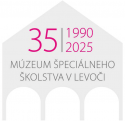Alois Klar
Alois Klar was born in the city of Úštek near Litoměřice.
In 1779 he graduated at grammar school and in 1782 was officially given a title of Master of Liberal Arts and Philosophy at the University of Prague. Later he studied theology. Due to serious health problems he could not perform priestly vocation so he decided to be a teacher, a professor of Rhetoric and Poetics in the Litoměřice grammar school (in 1806).
As a teacher he was noticing emergency circumstances of students, which led him to the creation of the Support student association at the University which existed exclusively from donations. In 1820 he became Dean of the Faculty of philosophy of the University of Prague.
At that time there was already existing a private institute for the poor blind and visually impaired patients in Prague (since 1807). Klar, however, suggested an establishment which could be a sort of continuation of Hradčany Institute in the sense of “employing and supporting” facility. In 1831 he outlined the comprehensive vision of the institute for the blind and received major support from the Empress Carolina Augusta.
Klar, then 69-years-old, rented a building on the Veľkoprievozske Square in Prague where on 4. 10. 1832 was opened a The Institution for Provision for and Employment for the Adult Blind in Bohemia. The trial employment for the blind became the knitting and spinning of the flax.
The successors of Klar’s work were: his only son Pavel Alois (1801-1860) and after his death in 1860 it was his youngest son Rudolf Mária.


